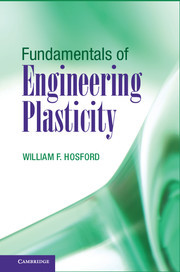Fundamentals of Engineering Plasticity
Langue : Anglais
Auteur : Hosford William F.

Ideal for those involved in designing sheet metal forming processes, where the understanding of advances in plasticity theory is essential.
William Hosford's book is ideal for those involved in designing sheet metal forming processes. Knowledge of plasticity is essential for the computer simulation of metal forming processes and understanding the advances in plasticity theory is key to formulating sound analyses. The author makes the subject simple by avoiding notations used by specialists in mechanics. R. Hill's authoritative book, Mathematical Theory of Plasticity (1950), presented a comprehensive treatment of continuum plasticity theory up to that time; much of the treatment in this book covers the same ground, but focuses on more practical topics. Hosford has included recent developments in continuum theory, including a newer treatment of anisotropy that has resulted from calculations of yielding based on crystallography, analysis of the role of defects, and forming limit diagrams. A much greater emphasis is placed on deformation mechanisms and the book also includes chapters on slip and dislocation theory and twinning.
1. An overview of the history of plasticity theory; 2. Yielding; 3. Stress and strain; 4. Isotropic yield criteria; 5. Bounding theorems and work principles; 6. Slip-line field theory; 7. Anisotropic plasticity; 8. Slip and dislocations; 9. Taylor and Bishop and Hill models; 10. Pencil glide calculations of yield loci; 11. Mechanical twinning and Martensitic shear; 12. Effects of strain hardening and strain-rate dependence; 13. Defect analysis; 14. Effects of pressure and sign of stress state; 15. Lower bound analysis; 16. Plasticity tests.
William Hosford is a Professor Emeritus of Materials Science at the University of Michigan, Ann Arbor. He is the author of numerous research publications and the following textbooks: Mechanical Behavior of Materials, 2nd Edition; Metal Forming, 4th Edition (with Robert M. Caddell); Materials Science: An Intermediate Text, Reporting Results (with David C. Van Aken); Materials for Engineers; Solid Mechanics; Materials for Engineers; Mechanics of Crystals and Textured Polycrystals; Physical Metallurgy, 2nd Edition; and Iron and Steel. He is the author of Wilderness Canoe Tripping (2009).
Date de parution : 07-2013
Ouvrage de 276 p.
15.6x23.5 cm
Disponible chez l'éditeur (délai d'approvisionnement : 14 jours).
Prix indicatif 53,83 €
Ajouter au panierThèmes de Fundamentals of Engineering Plasticity :
© 2024 LAVOISIER S.A.S.



